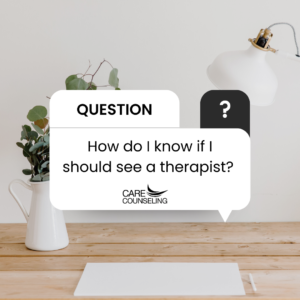How Do I Know If I Should See a Therapist?
 Life is a journey filled with ups and downs, and it’s perfectly normal to face challenges along the way. However, sometimes these challenges become overwhelming, affecting our emotional and mental well-being. In this blog, we’ll explore the signs that indicate you might need to see a therapist and why seeking professional help is a proactive and healthy choice.
Life is a journey filled with ups and downs, and it’s perfectly normal to face challenges along the way. However, sometimes these challenges become overwhelming, affecting our emotional and mental well-being. In this blog, we’ll explore the signs that indicate you might need to see a therapist and why seeking professional help is a proactive and healthy choice.
- Persistent Overwhelming Emotions
One of the clearest signs that you may benefit from therapy is experiencing persistent overwhelming emotions. This can manifest as intense sadness, anxiety, anger, or fear that disrupts your daily life. If you find yourself unable to manage these emotions or they continue for an extended period, therapy can provide strategies to help you cope and find emotional balance.
- Difficulty Coping with Life Changes
Life is constantly changing, and major life events such as a breakup, loss of a loved one, divorce, job loss, or relocation can be incredibly challenging to navigate. If you’re struggling to cope with significant life changes and it’s impacting your ability to function or maintain relationships, therapy can offer support and guidance during these transitions.
- Unresolved Trauma
Unresolved trauma from past experiences can have a profound impact on your mental health. Trauma may result from childhood abuse, accidents, violence, or any event that leaves emotional scars. If you find that past trauma continues to affect your daily life, relationships, or emotional well-being, therapy can provide a safe space for processing and healing.
- Persistent Relationship Issues
Relationships are a fundamental part of our lives, and when they become a source of distress, it’s essential to seek help. If you consistently face challenges in your relationships, whether it’s with a partner, family member, friend, or coworker, therapy can help you improve communication, set boundaries, and build healthier connections.
- Loss of Interest or Motivation
A sudden or persistent loss of interest in activities you once enjoyed, or a lack of motivation to pursue your goals, can be indicative of underlying emotional issues, such as depression or burnout. A therapist can help you identify the root causes and develop strategies to regain your passion and motivation.
- Sleep Problems and Physical Symptoms
Mental health issues often manifest physically. Insomnia, fatigue, headaches, digestive problems, and other physical symptoms can be connected to underlying emotional distress or mental health conditions. A therapist can help you uncover the connections between your physical symptoms and emotional well-being, leading to more effective treatment.
- Substance Abuse or Addictive Behaviors
If you’re using substances like drugs or alcohol to cope with emotional pain or if you find yourself engaging in addictive behaviors that are harming your well-being, it’s crucial to seek professional help. Therapy can address the underlying causes of addiction and provide strategies for recovery.
- Negative Thought Patterns
Consistently negative thought patterns, such as self-criticism, low self-esteem, or persistent feelings of worthlessness, can indicate underlying mental health issues like depression or anxiety. A therapist can help you challenge and reframe these negative thoughts, leading to more positive self-perception and emotional well-being.
- Difficulty Making Decisions
Struggling to make decisions or feeling paralyzed by fear of making the wrong choice is a sign of emotional distress. Therapy can provide guidance and support in developing decision-making skills and building confidence in your choices.
- Isolation and Social Withdrawal
If you find yourself withdrawing from social activities, isolating yourself from friends and loved ones, or feeling a persistent sense of loneliness, therapy can help address the underlying causes of social withdrawal and support you in rebuilding social connections.
Recognizing the need for therapy is a courageous and proactive step towards better mental and emotional well-being. If you identify with any of the signs mentioned above, it’s essential to remember that seeking therapy is not a sign of weakness but a sign of self-care and strength. Don’t hesitate to reach out for help when you feel it’s needed.



























